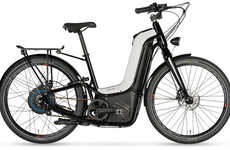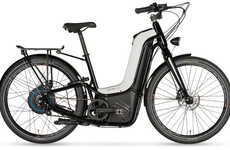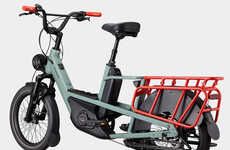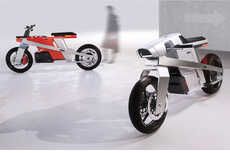



Ebike brands are turning to hydrogen fuel as a sustainable alternative
Trend - Brands in the micromobility space are further embracing sustainability through the incorporation of hydrogen fuel cells. When compared to lithium-ion batteries, these fuel cells charge significantly faster, use fewer resources, and are less prone to heat-induced damage.
Insight - Consumers who get into the micromobility space do so for a variety of reasons, often related to either convenience, cost, or environmental concerns. While traditional bikes offered these benefits over gas-powered vehicles as well, electric bikes boast more utility for these consumers, leading to many regarding them as vehicle replacements. Brands in the space are now pushing both the convenience and environmental friendliness even further by crafting ebikes with hydrogen fuel cells.
Insight - Consumers who get into the micromobility space do so for a variety of reasons, often related to either convenience, cost, or environmental concerns. While traditional bikes offered these benefits over gas-powered vehicles as well, electric bikes boast more utility for these consumers, leading to many regarding them as vehicle replacements. Brands in the space are now pushing both the convenience and environmental friendliness even further by crafting ebikes with hydrogen fuel cells.
Workshop Question - How could your brand capitalize off of emerging technologies to enhance the sustainability or convenience of its products or services?
Trend Themes
1. Hydrogen Fuel Cell Adoption - Hydrogen fuel cells offer faster charging and fewer resource demands compared to lithium-ion batteries, presenting a compelling alternative in the micromobility sector.
2. Micromobility Sustainability - Brands in micromobility are further promoting environmental stewardship by integrating hydrogen fuel technologies that enhance both convenience and eco-friendliness.
3. Open-source Engineering - Open-source engineering initiatives in the hydrogen motorcycle space foster innovation and allow for continuous improvements in eco-friendly transportation models.
Industry Implications
1. Automotive - The automotive industry sees significant potential in hydrogen fuel as a cleaner, faster alternative to traditional fuel and energy storage methods.
2. Renewable Energy - Renewable energy sectors are exploring hydrogen as a versatile and sustainable fuel source that can be generated through eco-friendly processes like solar-powered electrolysis.
3. Consumer Electronics - Consumer electronics and mobility sectors integrate hydrogen technology to create more efficient and environmentally friendly transportation options such as ebikes and scooters.
4 Featured, 31 Examples:
53,125 Total Clicks
Date Range:
Dec 23 — Jun 24
Trending:
This Year and Warm
Consumer Insight Topics:


































